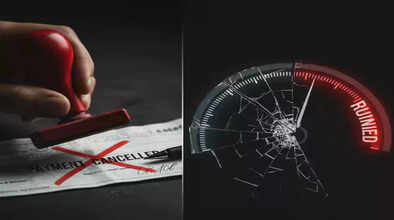CIBIL Score Tips: Can a bounced check ruin your CIBIL score? Understand here...

Nowadays, if you want to get a loan or credit card from any bank, the first thing that's considered is your CIBIL score. This score reflects your credit history, repayment capacity, and repayment discipline. A good score not only helps you secure a loan from a bank but also offers lower interest rates. However, a drop in your score can make it difficult to get a loan.
Does a bounced check impact your CIBIL score?
Many people wonder: If a check bounces, will it impact your CIBIL score? Banks don't report every check bounce directly to credit rating agencies. Therefore, a check bounce alone doesn't impact your score. However, if the payment associated with that bounced check—such as an EMI, loan, or credit card bill—isn't cleared on time, the bank reports it as a missed payment or default, which can harm your score.
When does your CIBIL score drop?
So, suppose you gave a post-dated check for a bank loan EMI and it bounced. If you don't make the next payment immediately, the bank will consider it a missed EMI. In such cases, your CIBIL score could drop by 20 to 50 points. However, if this mistake occurs repeatedly, the score drops rapidly, and the chances of loan approval are greatly reduced.
Key Reasons for Check Bounces
1. Lack of balance in the account – This is the most common reason.
2. Signature discrepancy – If the signature on the check does not match the bank records.
3. Wrong or future date – A post-dated check may bounce if deposited earlier.
4. Overwriting or error – If there is a discrepancy between words and numbers in the amount, the bank will reject the check.
5. Closed account or limit exceeded – Even checks for amounts exceeding the overdraft limit will not be cleared.
6. Checks are damaged or lack legible writing – The bank will not clear checks if they are physically damaged.
Repeated check bouncing may result in the bank imposing penalties, or in serious cases, even legal action. This can negatively impact your credit profile.
Tips to avoid check bouncing and a drop in your CIBIL score:
Always maintain a sufficient balance in your bank account.
Recheck the date, amount, and signature on the check.
Do not use expired or overwritten checks.
If a check bounces for any reason, contact the beneficiary or bank immediately.
Pay EMIs and credit card bills on time.
What to do if your CIBIL score drops?
1. Pay the outstanding amount – Clear any missed EMIs or card bills immediately.
2. Understand your guarantor responsibility – If you are a guarantor for someone who is not making payments, take corrective action immediately.
3. Check your credit report regularly – Correct any mistakes or errors promptly.
4. Use your new credit limit wisely – don't spend more than 30% of the limit.
5. Get your old loan closure reported – to see a positive impact on your score.
Conclusion
Check bouncing doesn't harm your CIBIL score in itself, but if it results in a delay in EMI or loan repayment, it can impact your score. Therefore, caution and discipline in your banking behavior are crucial. Always make payments on time and maintain transparency in your financial transactions. This will keep your CIBIL score strong and prevent any problems with future loans or credit card purchases.
Disclaimer: This content has been sourced and edited from Zee Business. While we have made modifications for clarity and presentation, the original content belongs to its respective authors and website. We do not claim ownership of the content.

